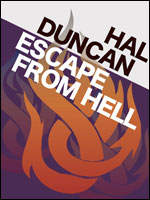Guest Post: How to Write a Sentence
by Hal Duncan
 In the paid critiques I do for the Writers’ Workshop, I’m often faced with writers with a level of narrative prose so rudimentary that I really can’t just tell them it needs polish in this respect or that; I pretty much have to tell them the basics of how to write a sentence. Of narrative, that is. Even when the prose is perfectly acceptable as prose in and of itself, there can be so much that’s wrong, to be honest, in terms of how it works as narrative, that the easiest thing to do is just pick one sentence in particular and show them how to rewrite it, take them step-by-step through the application of some basic principles. Hell, even when their prose isn’t too bad, it’s easier to demonstrate than to explain the how abstractly.
In the paid critiques I do for the Writers’ Workshop, I’m often faced with writers with a level of narrative prose so rudimentary that I really can’t just tell them it needs polish in this respect or that; I pretty much have to tell them the basics of how to write a sentence. Of narrative, that is. Even when the prose is perfectly acceptable as prose in and of itself, there can be so much that’s wrong, to be honest, in terms of how it works as narrative, that the easiest thing to do is just pick one sentence in particular and show them how to rewrite it, take them step-by-step through the application of some basic principles. Hell, even when their prose isn’t too bad, it’s easier to demonstrate than to explain the how abstractly.
So I’ve thought for a while that maybe I should turn all that work into some sort of Sentence Writing 101 post for the blog, but of course, I can’t exactly use a client’s text even anonymously. What to do, then? What to do? It’s actually kind of hard to deliberately write a sentence that’s fucked up in all the ways I need for such a demo. But fear ye not. A flash of inspiration hit me, I had a quick shufty online, and came up with this prime example from Jim Theiss’s seminal 1970 novel, The Eye of Argon:
A sweeping blade of flashing steel riveted from the massive barbarians hide enameled shield as his rippling right arm thrust forth, sending a steel shod blade to the hilt into the soldiers vital organs.
I think we can safely all agree that this is unmitigated shite, yes? OK, then. Let’s take a closer look at it and see if we can’t perform a little alchemy, transform it… well, if not into gold then at least into a serviceable steel. Because really, the principles involved in writing a decent fucking sentence of narrative… they’re not that fucking complex.
1. Decision
There are many things you want to say in a sentence, but you can’t say them all. Decide between them. There are many ways a thing might be said. Decide between them. There are many words on the shelf, close enough to hand that you could grab any one of them and just chuck it in there. Don’t. Stop. Look at those words. Decide between them. And when you do put the words down on the page, there’s still a decision to be made as to whether the sentence says what you want it to.
Good decision is conscious, considered, confident, conclusive*. To be those things, decision must be informed. Decision resolves. Decision is therefore ultimately about clarity — clarity of purpose creating clarity of import.
So…
You’re aiming to say three things here, that (1) a blade is swung by a barbarian as (2) his arm thrusts forward, (3) skewering a soldier’s belly.
The word “riveted” has been grabbed off the shelf. Is this what you mean? Check the dictionary. No, it’s not. How about “enameled”? No, that’s clearly just the first that came to hand too. You figured, what the fuck, it was close enough — but it’s not. And “shod”? A blade is made of steel, not shod with it. Did you stop and think what you’re trying to say? Did you mean that the sword comes out of the shield (huh?!) or out from behind it? Did you mean that the blade is sent to the hilt or that it’s sent up to the hilt?
With “rivet,” you should be deciding that you mean a sudden action as from a riveter’s gun — a shooting forward. With “enameled,” you should be deciding that you mean “wrapped in.” With “steel shod blade,” you should be deciding you just mean “steel blade.” You should be deciding that the sentence needs “behind” and “up”:
A sweeping blade of flashing steel shot forward from behind the massive barbarian’s hide-wrapped shield as his rippling right arm thrust forth, sending a steel blade up to the hilt into the soldier’s vital organs.
2. Excision
There are many things you can say in a sentence, but you don’t want to say them all. We do not give a fuck about many of the things you could say. We do not give a fuck about most of them. Redundancy is fat, and fat should be flensed. Adjectives and adverbs — all modifying terms — are to be met with the ruthless scalpel of a surgeon. Do they actually add information that is not carried in the verb or adjective already? Even if so, is it information we need? Even whole clauses are to be put to the sword if they repeat what has already been said. If clarity is a primary aim, so too is economy. Excise all that is extraneous.
So here, since the motion of the sword is the predicate of a clause, it doesn’t have to be a quality of the subject too. “The moving blade moved” is redundancy, the verb rendering the adjective extraneous. We can eliminate “sweeping” then. We don’t need to specify that it’s his “right” arm either; the reader’s imagination will default to that. And if the blade “shot forward” then we don’t need to know that the arm holding it “thrust forth.” This is one action, not two. The secondary action performed by that arm is to send the sword into the soldier’s guts, so we can cut and stitch. Similarly we already know that the object in use is “a steel blade.”
So this:
A [sweeping] blade of flashing steel shot [forward] from behind the massive barbarian’s hide-wrapped shield as his rippling [right] arm [thrust forth], sending [a steel blade] up to the hilt into the soldier’s vital organs.
Becomes:
A blade of flashing steel shot from behind the massive barbarian’s hide-wrapped shield as his rippling arm sent it up to the hilt into the soldier’s vital organs.
3. Precision
There are many ways a thing might be said. Vaguely is not good enough. Where a sentence of basic prose is purposed to communicate, a sentence of narrative is purposed to conjure. A sentence that only communicates what happened is not narrative; it is deposition. Your job is not just to convey the basic gist of a sequence of events to the reader, but to invoke that sequence of events vividly in their imagination from the cumulative import of every word and phrase. Vividness is cumulative, but so is vagueness, and vagueness is not good enough. Exchange generic terms for precise ones. Look for stopgap phrasings where there’s an exact word for the meaning you’re delineating clumsily. Look for stopgap combinations that don’t work if you really consider the precise meaning. After clarity and economy comes accuracy.
So, here, “shot” is a generic term for sudden movement, including all manner of firing and dashing motions. The word you want is “thrust.” Likewise “sent” is a generic term for getting something from A to B, where we could be using something specific to the immersion of a blade in a soldier’s guts, like “buried.” The term “hide-wrapped” is a stopgap phrasing for a meaning nailed by the term “leathered.” Knowing this about the shield, we know what type of shield it is, can replace the generic “shield” with “targe.” And “rippling arm” is rather inaccurate. An arm doesn’t ripple; it’s the muscles of an arm that ripple. So we take the sentence on another step:
A blade of flashing steel thrust from behind the massive barbarian’s leathered targe as the rippling muscles of his arm buried it up to the hilt in the soldier’s vital organs.
4. Concision
There are many words on the shelf that you could use to say precisely what you mean. But there are some words you can use to say even more than precisely what you mean here. And if the additional import is one you’re trying to convey elsewhere, you can pot those two balls with one shot. The word or phrase you use to describe an action can capture qualities of the object performing it, and vice versa. If you can say two things with one word, do so. Even if there’s no rebound import, if you can use two words in place of three, do so.** “But isn’t this just economy?” I hear you say. Yes, this is economy returned with a vengeance. Where economy is about rigour, this is about vigour.
So, the word “flashing” is here being used to conjure the reflection of light off the blade, but it is also loaded with an import of motion, sudden and swift. So we can kill two birds with one stone, let “flash” be the verb. It lacks the precision of “thrust,” but it binds object and action into object-in-action. The phrase “blade of steel” can also now become simply “steel blade.”
A steel blade flashed from behind the massive barbarian’s leathered targe as the rippling muscles of his arm buried it up to the hilt in the soldier’s vital organs.
5. Incision
When you put the words down on the page, does the sentence say what you want it to? The question is, what do you want it to say? The better question is, what do you want it to do? Do you want it to, for example, encapsulate the import of the action, as it happens, how it happens? To cut to the very quick of the event, to conjure it not just as a superficial description of how this did that and such-and-such happened, but to slice it open and drop the reader right in it? Then you need to carve into the nature of reality itself.
How does a sudden attack that puts a sword in your belly play from the inside? If you’d seen the blade properly would it be in your belly? Didn’t you see it properly a little too late, when it was up to the hilt? Shift that “blade” and we shift the awareness of it.
Steel flashed from behind the massive barbarian’s leathered targe as the rippling muscles of his arm buried his blade up to the hilt in the soldier’s vital organs.
Did his arm skewer you with his sword or did he do it, him, the fucking cunt? Did your arm skewer him with your sword or did you do it, you, because you’re a fucking god among men? Let muscles of his arm do what they actually did — ripple — and let the barbarian take the glory/guilt that’s his:
Steel flashed from behind the massive barbarian’s leathered targe, as the muscles of his arm rippled and he buried his blade up to the hilt in the soldier’s vital organs.
Is his mass mere flabby corpulence, or is it the rippling-muscled brawny bulk of a warrior? Attach “massive” to the muscle rather than the barbarian and we lose the direct specification of his size but gain a more precise, albeit indirect, specification that conjures the larger picture from the telling detail:
Steel flashed from behind the barbarian’s leathered targe, the massive muscles of his arm rippling as he buried his blade up to the hilt in the soldier’s vital organs.
Apply concision. Apply all previous principles. These aren’t stages you move on from, go through one by one. There’s no moving on until the sentence is good. So, apply concision. What are “massive muscles” but brawn?
Steel flashed from behind the barbarian’s leathered targe, the brawn of his arm rippling as he buried his blade up to the hilt in the soldier’s vital organs.
Did you bury your blade in his vital organs, or did you sink it in his guts? How do you think of innards as a barbarian? How do you think of sticking the fucker? Isn’t there just a little more of your satisfaction reflected in a sssssank!
Steel flashed from behind the barbarian’s leathered targe, the brawn of his arm rippling as he sank his blade up to the hilt in the soldier’s guts.
6. Decision
There are many ways to structure the words in a sentence. There are all the commas and conjunctions you could ever want on the shelf, close enough to hand that you could just grab them and chuck them onto the page, as and when it seems you could maybe do with one. Put them down and look at the sentence. Just because it’s grammatically correct doesn’t mean it’s good. Remember, where a sentence of basic prose is purposed to communicate, a sentence of narrative is purposed to conjure. The logic of structuring a sentence of narrative goes beyond grammar. It is a matter of dynamics, of focus turning and twisting this way and that, slick as a swordsman’s parry, feint and thrust. The structure of your sentence is its dynamics. The dynamics of your sentence is its drive. The drive of your sentence is the impetus of narrative, drawing the reader in, whirling them through your slingshot syntax, hurtling them onward, sentence to sentence to sentence. There are many ways to structure the words in a sentence. Decide between them.
So, here, the swift flashing of steel requires a swift phrasing. So we switch the full descriptor for a punchier pronoun, let the brute hulk of the barbarian fall back to his moment of triumph:
Steel flashed from behind his leathered targe, the brawn of his arm rippling as the barbarian sank his blade up to the hilt in the soldier’s guts.
If that steel is being whipped out from behind the shield, suddenly being made visible, we can let the structure of the sentence reflect that, present the “from” adverbial first, then spring the flashing steel upon the reader as suddenly as it’s sprung on the soldier:
From behind his leathered targe, steel flashed, the brawn of his arm rippling as the barbarian sank his blade in the soldier’s gut up to the hilt.
When does the brawn of his arm ripple? Simultaneous with the sinking of the blade, but after the flash of steel? Or vice versa? Is it all happening at once — steel flashing as brawn ripples as the blade sinks into guts? Or is what we’re going for here the sequence in which they register, the shift of those moments… quick, quick, and suddenly all too final.
From behind his leathered targe, steel flashed, the brawn of his arm rippled, and the barbarian sank his blade in the soldier’s guts up to the hilt.
If we’re applying the same logic of perception to the rippling of brawn as to the flashing of steel though, let’s apply the same syntax. We’re not losing the precision of an arm, if you think about what brawn is actually involved here. We’re gaining the precision of an arm, a shoulder, a whole body putting its bulk behind that blow:
From behind his leathered targe, steel flashed, brawn rippled, and the barbarian sank his blade in the soldier’s guts up to the hilt.
But in that final action, is it awkward that the “up to the hilt” is dislocated from “sank his blade”? Would a reversal of phrasing, “sank his blade up to the hilt in the soldier’s guts,” be better? Or maybe that dislocation is exactly what we want — two stages for the blade’s motion, “in” and “up to the hilt.” Let’s apply incision here, and carve ourselves a new clause entirely, bring back a verb from the cutting room floor to give the barbarian a syntax that springs out steel and brawn on the soldier too fast for him to deal with, skewers the poor fucker in the belly, and then drives his death home to him with relish:
From behind his leathered targe, steel flashed, brawn rippled, and the barbarian sank his blade in the soldier’s guts, thrust it up to the hilt.
That’s how you write a sentence. It’s not a great sentence, just passable, but then really, if you asked me to get to a good sentence from that line, I’d suck my teeth, shake my head and say, “You don’t want to be starting from here, mate.” But it’s a functional sentence of narrative, wrangled out of shite by the application of basic principles to the words and their structurings — those principles of decision, excision, precision, concision, incision… which are all, you’ll note, derived from the Latin word for cut. Words are, as I’ve said before, the only substance. Style is not a patina, a decorative finish; it is a process, the process described above, performed with the scalpel of one’s savvy upon that substance.
Which is why, of course, the end result is 25 words versus the 34 of the original.
Because style is not a fucking patina.
***
* Excellent decision is instinctive, intuitive, instant, a skill learned to automation, but to master the skill to excellence you need to go through competence. If you think you have mastery as an innate facility, I am not innarested in your condition.
** Unless there’s a damn good reason not to, like not demoting an object to mere modifier, or simply because it would foul the rhythm. Note that I haven’t changed “rippling muscles of his arm” to “rippling arm muscles.” The rhythm of the former is smooth, a slicker combo of syncopated punches finishing on an uppercut — DUMdum DUHruhruhruh DUM — while that of the latter is awkward — DUDdum DUM DUHruh — not helped by the shared “m” at the end of “arm” and start of “muscles.”
•••
 Hal Duncan was born in 1971, brought up in a small town in Ayrshire, and now lives in the West End of Glasgow. A member of the Glasgow SF Writers Circle, his first novel, Vellum, won the Spectrum Award and was nominated for the Crawford, Locus, BFS and World Fantasy Awards. As well as the sequel, Ink, he has published a number of poetry collections, most recently Songs for the Devil and Death, a stand-alone novella, Escape From Hell!, and various short stories in magazines such as Fantasy, Strange Horizons and/Interzone, and anthologies such as Nova Scotia, Logorrhea, and Paper Cities. A short story collection is due out next year from Lethe Press. His musical, Nowhere Town, was produced by a theatre group in Chicago, and he also collaborated with Scottish band Aereogramme on the song “If You Love Me, You’d Destroy Me” for the Ballads of the Book album from Chemikal Underground. This post first appeared on his blog.
Hal Duncan was born in 1971, brought up in a small town in Ayrshire, and now lives in the West End of Glasgow. A member of the Glasgow SF Writers Circle, his first novel, Vellum, won the Spectrum Award and was nominated for the Crawford, Locus, BFS and World Fantasy Awards. As well as the sequel, Ink, he has published a number of poetry collections, most recently Songs for the Devil and Death, a stand-alone novella, Escape From Hell!, and various short stories in magazines such as Fantasy, Strange Horizons and/Interzone, and anthologies such as Nova Scotia, Logorrhea, and Paper Cities. A short story collection is due out next year from Lethe Press. His musical, Nowhere Town, was produced by a theatre group in Chicago, and he also collaborated with Scottish band Aereogramme on the song “If You Love Me, You’d Destroy Me” for the Ballads of the Book album from Chemikal Underground. This post first appeared on his blog.


